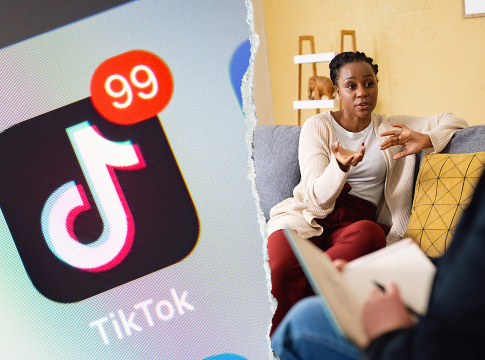The Impact of TikTok on Mental Health: A Call for Awareness
In recent months, TikTok has become a popular platform for sharing mental health tips, but a new study reveals a concerning trend: a significant number of these videos contain misinformation. Understanding the nature of this content can help us navigate the digital landscape of mental health advice more safely.
The Findings
A report from The Guardian detailed an analysis of the top 100 trending TikTok videos under the hashtag #mentalhealthtips. This review involved experts—psychiatrists, psychologists, and academics—who identified that over 50% of these videos presented misleading information. Specific examples of problematic advice included the suggestion to use supplements such as holy basil or saffron, or even unconventional methods like eating an orange in the shower to alleviate anxiety.
The Risks of Misinformation
The ramifications of this misinformation can be profound. Dr. Dan Poulter, a former health minister and NHS psychiatrist, expressed concern that these videos often "pathologize normal emotional experiences," potentially discouraging individuals from seeking appropriate support. This oversimplification can trivialize the experiences of those genuinely struggling with mental health conditions.
Moreover, Amber Johnston, a psychologist affiliated with the British Psychological Society, noted that while certain aspects of these videos may contain truth, they often fail to acknowledge the unique nature of each individual’s experiences with trauma or PTSD. Mental health symptoms can vary widely; thus, a) what works for one person may not resonate with another, and b) quick solutions presented in 30-second clips often lack the depth required for real healing.
Navigating Social Media Mindfully
As we engage with platforms like TikTok, it’s crucial to approach mental health advice with a discerning eye. Here are a few gentle reminders to support our wellness journey in the age of social media:
- Fact-check Before You Follow: Seek additional information from credible sources, such as mental health organizations or licensed professionals.
- Recognize Misinformation: Understand that not all personal stories or snippets of advice will apply to your circumstance. Mental health is deeply personal and complex.
- Prioritize Professional Help: If you’re experiencing significant emotional distress or mental health challenges, consulting a qualified mental health professional remains the best course of action.
A Call for Responsible Sharing
While TikTok emphasizes that harmful content is removed and they collaborate with health experts, the reality persists that misinformation can easily spread through algorithms that prioritize engagement over accuracy. Chi Onwurah, a UK MP, highlights the need for improved regulations to ensure that platforms like TikTok do not inadvertently perpetuate harmful myths about mental health.
Conclusion: Empowering Our Wellness Journey
Navigating mental health information online requires both care and critical thinking. While platforms may offer a space for sharing experiences, it is essential to approach this content thoughtfully. Recognizing the complexities of mental health challenges in ourselves and others invites a more compassionate outlook, paving the way for genuine understanding and healing.
By staying informed and connected to reliable resources, we empower ourselves to foster a healthier relationship with both our mental well-being and the information we consume. Always remember: you deserve support that honors your unique journey.

Covers wellness, nutrition, mental health, and daily life tips.
Bio: Talia brings a background in health journalism and holistic living to help readers live better, one tip at a time.

